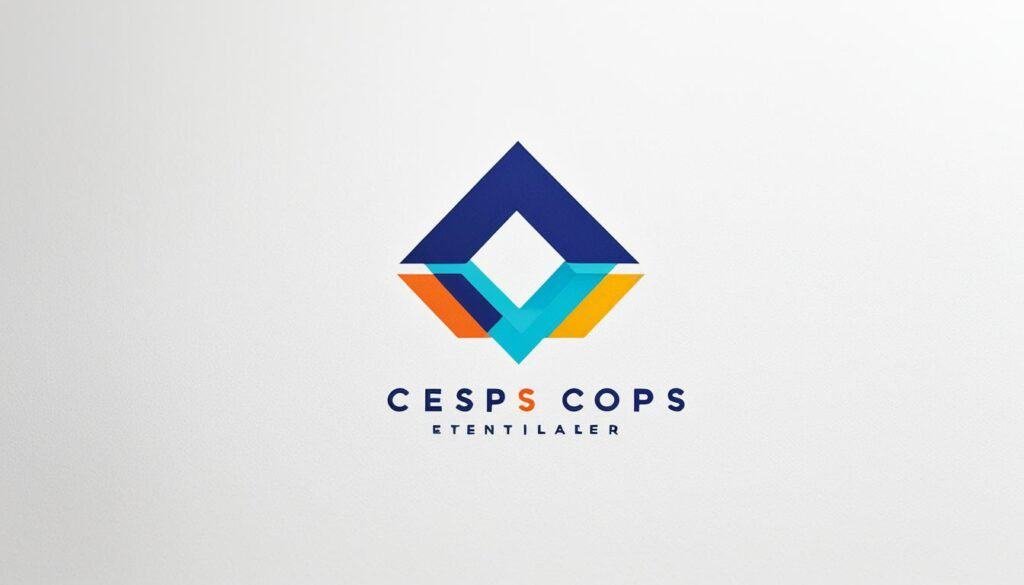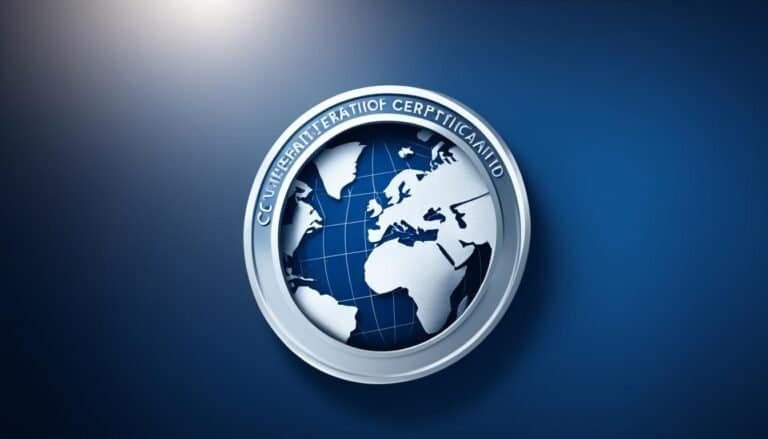Certified Event Planning Specialist (CEPS)
Did you know that the event planning industry is projected to grow by 8% from 2021 to 2029? With the increasing demand for immersive experiences and unforgettable events, there has never been a better time to pursue a career in event planning. But how can you stand out from the competition and position yourself as a trusted professional in this thriving industry?
One way to distinguish yourself and gain the necessary expertise is by obtaining a Certified Event Planning Specialist (CEPS) certification. Accredited by the National Career Certification Board (NCCB), the CEPS credential demonstrates your commitment to excellence and ensures you have the knowledge and skills to plan and execute successful events.
Key Takeaways:
- Event planning is a rapidly growing industry with a projected 8% growth rate in the coming years.
- A Certified Event Planning Specialist (CEPS) certification can set you apart from the competition and validate your expertise.
- The CEPS certification is accredited by the National Career Certification Board (NCCB) and signifies a high level of professionalism and competency.
- Obtaining a CEPS certification opens doors to new job opportunities and enhances your earning potential in the event planning industry.
- Continued education and certification are essential for staying competitive and evolving in this fast-paced industry.
The Importance of Event Planning Certification
Getting certified in event planning has numerous benefits. It provides access to valuable information and resources that can enhance event planning skills, such as budgeting, venue selection, and logistics management. Certification also demonstrates professionalism and expertise to potential clients, partners, and employers, increasing job opportunities and earning potential. Additionally, certification opens doors to a network of professionals in the industry, allowing for collaboration and further growth.
Obtaining a certification in event planning is a significant step towards building a successful career in the industry. Whether you are just starting out or looking to advance your current position, investing in event planning certification can make a significant difference in your professional journey.
Event planning courses and training programs cover a wide range of topics that are essential for success in the field. From event marketing and promotion to technical aspects like audiovisual production and event technology, these courses provide the knowledge and skills needed to excel as an event planning specialist.
Event planning certifications not only validate your expertise but also showcase your dedication and commitment to the profession. They act as a stamp of approval and set you apart from competitors, elevating your chances of securing lucrative job opportunities and building a successful event planning career.
Whether you are interested in corporate events, weddings, nonprofit functions, or other types of events, a certification in event planning will equip you with the necessary skills and knowledge to create memorable experiences for clients and attendees. It demonstrates your ability to handle all aspects of event management, from conceptualization to execution, ensuring that every detail is thoughtfully considered.
Benefits of Event Planning Certification:
- Enhanced Skills: Event planning certification programs provide comprehensive training in various aspects of event management, enabling you to develop essential skills like budgeting, risk management, and vendor negotiation.
- Credibility and Professionalism: Certification establishes your credibility as an event planning specialist and showcases your dedication to professional growth. It instills confidence in potential clients, partners, and employers, making you a desirable candidate for event planning opportunities.
- Networking Opportunities: By becoming certified, you gain access to a vast network of event planning professionals, allowing you to connect, collaborate, and learn from industry experts. Networking is crucial for career advancement in the event planning field.
- Job Opportunities: Employers often prioritize candidates with event planning certifications, as they demonstrate a higher level of expertise and commitment. Certification increases your marketability and opens doors to a broader range of job opportunities.
- Increased Earning Potential: With event planning certification, you position yourself for higher-paying roles within the industry. Certified professionals often earn more than their non-certified counterparts due to their specialized knowledge and skills.
Investing in event planning certification is a wise choice for aspiring and experienced event planners alike. It not only provides you with the necessary skills and knowledge but also sets you apart as a qualified and competent professional in the field. To excel in your event planning career and maximize your potential, obtaining a certification is a significant step forward.
Industry-Recognized Certifications
There are several industry-recognized certifications in event planning that hold high value and credibility. These include the Certified Special Events Professional (CSEP), Certified Meeting Professional (CMP), and Certificate in Meeting Management (CMM). Each certification sets a standard for excellence in event planning and requires a combination of experience, education, and exams to obtain. These certifications demonstrate a deep understanding of event planning principles and increase career opportunities in the industry.
The Certified Special Events Professional (CSEP)
The Certified Special Events Professional (CSEP) designation is one of the most respected certifications for event planners. This certification validates expertise in planning and executing successful special events. To earn the CSEP credential, candidates must demonstrate their knowledge, experience, and commitment to professional standards in event planning.
The Certified Meeting Professional (CMP)
The Certified Meeting Professional (CMP) designation is a globally recognized certification for professionals in the meeting and event industry. This certification showcases expertise in planning, managing, and executing meetings and events of all sizes and formats. To become a CMP, candidates must meet specific criteria, including professional experience, education, and passing the CMP exam.
The Certificate in Meeting Management (CMM)
The Certificate in Meeting Management (CMM) is an esteemed certification that equips professionals with the skills and knowledge to excel in meeting management. This certification program covers essential topics such as strategic planning, budgeting, contract negotiation, and event marketing. Participants gain valuable insights and strategies to successfully organize and host meetings and events.
The CSEP, CMP, and CMM certifications are highly regarded in the event planning industry, as they demonstrate a comprehensive understanding of event management principles and a commitment to professional development. These certifications not only enhance career prospects but also provide access to a network of industry professionals, further elevating the expertise and credibility of certified event planners.
| Certification | Description |
|---|---|
| CSEP | The Certified Special Events Professional (CSEP) designation validates expertise in planning and executing special events. |
| CMP | The Certified Meeting Professional (CMP) certification showcases proficiency in planning and managing meetings and events. |
| CMM | The Certificate in Meeting Management (CMM) equips professionals with the skills needed to excel in meeting management. |
These certifications provide event planners with the knowledge, skills, and recognition needed to succeed in the competitive field of event management. Whether one chooses to pursue the CSEP, CMP, or CMM certification, each offers unique benefits and opportunities for professional growth.
Other Proprietary Certifications
While industry-recognized certifications like CEPS, CSEP, CMP, and CMM hold significant value in the event planning industry, there are also proprietary certifications offered by specific schools or organizations. These certifications provide valuable training and further enhance a professional’s skillset in event planning. However, it’s important to note that proprietary certifications may not carry the same level of recognition and credibility as the industry-standard ones. Prospective event planners must carefully consider the reputation and standing of these certifications before pursuing them.
One such proprietary certification is the GCPE: Global Certification in Professional Events, offered by an esteemed event planning institute. This certification focuses on equipping event planning specialists with comprehensive knowledge and expertise needed to thrive in the global events industry.
Another proprietary certification available is the IEPP™: International Event Planning Professional, designed for professionals seeking advanced training and specialization in international event planning. It offers valuable insights into global event management strategies and cross-cultural event execution.
While these proprietary certifications can provide valuable training, it’s essential to consider the industry recognition and credibility they hold. Event planners should thoroughly research the reputation and legitimacy of these certifications before investing their time and resources.
Benefits and Limitations of Other Proprietary Certifications
Below is a comparison between the industry-recognized certifications and the proprietary certifications, highlighting their respective benefits and limitations:
| Industry-Recognized Certifications | Proprietary Certifications |
|---|---|
|
|
|
|
Certified Meeting Professional (CMP)
The Certified Meeting Professional (CMP) designation is a globally recognized credential that demonstrates expertise in negotiating contracts, planning events, managing risks, and marketing. This certification is ideal for professionals seeking to excel in meeting and event management.
CMP Certification Requirements:
- Minimum of three years of professional experience in meeting management
- 25 hours of continuing education credits
Obtaining the CMP title opens doors to various benefits and opportunities:
- Increased job opportunities: The CMP credential enhances your marketability and makes you a desirable candidate for event planning positions.
- Higher pay: With the CMP certification, professionals often earn higher salaries compared to their non-certified counterparts.
- Exclusive network: CMP certification provides access to a global network of meeting professionals, facilitating collaboration and knowledge-sharing.
The CMP designation showcases your commitment to professionalism, industry knowledge, and continuous learning, making you a trusted professional event planner.
Certified Special Events Professional (CSEP)
The Certified Special Events Professional (CSEP) designation is a globally recognized credential that signifies excellence in special event management. This certification is specifically tailored to professionals who specialize in planning and executing unique and memorable events.
To become a Certified Special Events Professional (CSEP), candidates must demonstrate a comprehensive understanding of the intricacies of event planning. They need to showcase their knowledge and experience in various aspects, including event design, logistics management, budgeting, and event evaluation.
By obtaining the CSEP certification, event planners can unlock new opportunities in their careers. This industry-recognized credential adds credibility and showcases their commitment to delivering exceptional events. Employers and clients value the expertise and professionalism associated with the CSEP designation, making certified professionals highly sought after in the event planning industry.
Here’s a summary of the benefits and requirements of the Certified Special Events Professional (CSEP) certification:
Benefits of CSEP Certification:
- Increased job opportunities
- Higher compensation
- Enhanced credibility and reputation
- Access to a global network of event professionals
Requirements for CSEP Certification:
- Minimum of three years of professional experience in event planning
- Demonstration of knowledge and experience in planning, budgeting, executing, and evaluating special events
- Successful completion of the CSEP exam
Table: Comparison of Industry-Recognized Event Planning Certifications
| Certification | Organization | Requirements | Benefits |
|---|---|---|---|
| CSEP | International Live Events Association (ILEA) | Minimum 3 years of professional experience, knowledge, and experience in event planning |
|
| CMP | Events Industry Council (EIC) | Minimum 3 years of professional experience, Continuing Education credits, passing the CMP exam |
|
| CMM | Meeting Professionals International (MPI) | Minimum 3 years of professional experience, completion of MPI’s Meeting and Business Essentials course, completion of MPI’s Experiential Event Series, passing the CMM exam |
|
Certificate in Meeting Management (CMM)
The Certificate in Meeting Management (CMM) is a globally recognized professional credential that equips meeting and event professionals with the skills and knowledge to plan and execute successful meetings and events. The CMM certification program covers topics such as venue selection, contract negotiation, and logistics management.
The CMM certification offers the following benefits:
- Enhanced job opportunities
- Career advancement
- Leadership development in the events industry
CMM Certification Program Overview
The CMM certification program is designed to provide industry professionals with a comprehensive understanding of meeting management. Through a combination of coursework, practical training, and exams, participants develop the skills necessary to excel in planning and executing successful meetings and events.
| CMM Certification Program | Content Covered |
|---|---|
| Venue Selection | Learn strategies for choosing the right venues to meet event goals and requirements. |
| Contract Negotiation | Develop negotiation skills to secure favorable contracts with vendors and service providers. |
| Logistics Management | Gain expertise in managing event logistics, including transportation, accommodations, and audiovisual equipment. |
By completing the CMM certification program, professionals gain a competitive edge in the industry and strengthen their ability to meet client needs and exceed expectations.
Achieving the CMM certification is a testament to a professional’s commitment to excellence in meeting management. It not only enhances career prospects but also provides opportunities for growth and advancement in the dynamic events industry.
With a CMM certification, event planners can expect to:
- Expand their professional network
- Gain access to exclusive industry events and conferences
- Stay updated on the latest trends and best practices in meeting management
- Demonstrate their expertise to clients and employers
Whether you’re an experienced event planner looking to advance your career or a newcomer to the field seeking to establish your credentials, the CMM certification offers valuable knowledge and credibility to propel your success as a professional event planner.
CEPS Event Planning Specialist Certification
The CEPS Event Planning Specialist Certification, issued by the National Career Certification Board (NCCB), is a top certification program for event planners. This esteemed certification provides comprehensive training and knowledge in event planning, covering crucial aspects such as event management, event marketing, event operations, and event technology.
The CEPS certification is recognized worldwide and holds immense value within the event planning industry. It is designed to equip professionals with the necessary skills and expertise to excel in their roles as event planners and specialists. By obtaining this certification, individuals can demonstrate their commitment to professional excellence and enhance their career prospects in event planning.
With the CEPS Event Planning Specialist Certification, professionals gain access to a wide range of opportunities to connect and collaborate with other certified event planning specialists across the globe. This network allows for knowledge sharing, mentorship, and continuous learning, further enriching the event planning community.
Importance of Continued Education and Certification
Continued education and certification play a vital role in the success of event planners, allowing them to stay updated on industry trends and enhance their skills. Even for those with a degree in event management, ongoing education and certification provide specialized knowledge that keeps professionals competitive in the ever-evolving event industry. Certifications like Certified Special Events Professional (CSEP), Certified Meeting Professional (CMP), Certificate in Meeting Management (CMM), and Certified Event Planning Specialist (CEPS) demonstrate a commitment to professionalism and continuous development.
By pursuing event planning courses and training, professionals can acquire the latest techniques, tools, and strategies to plan and execute successful events. These courses cover topics such as event marketing, budgeting, contract negotiation, and technology integration, equipping event planners with the necessary skills to deliver exceptional experiences for clients.
Moreover, earning industry-recognized certifications not only enhances credibility but also opens doors to more job opportunities and higher earning potential. Employers and clients value event planners with proven expertise and qualifications, making certified professionals highly sought after in the event planning industry.
Beyond the tangible benefits, continued education and certification foster personal and professional growth. They provide a platform for networking and collaboration, connecting event planners with industry experts and like-minded professionals. These connections create opportunities for mentorship, shared knowledge, and potential partnerships, ultimately enhancing career prospects and expanding professional horizons.
Investing in Continued Education and Certification
Event planners should view continued education and certification as valuable investments in their careers. As the event industry continues to evolve, staying up-to-date with the latest trends, technologies, and best practices is essential for remaining competitive.
“Education is the most powerful weapon which you can use to change the world.”
Continued education empowers event planners to offer innovative and creative solutions to their clients, positioning them as industry leaders and setting them apart from the competition. The knowledge gained through education and certification enables event planners to adapt to changing market demands, tackle new challenges, and deliver exceptional results.
Furthermore, continued education and certification provide event planners with a sense of professional fulfillment and personal accomplishment. By continuously expanding their knowledge and skill set, event planners cultivate a growth mindset and demonstrate a dedication to their craft.
In this fast-paced industry, it’s crucial for event planners to commit to lifelong learning and professional development. Event planning courses, training programs, and industry-recognized certifications serve as the foundation for a successful and fulfilling event planning career.
Key Benefits of Continued Education and Certification
| Benefits | |
|---|---|
| 1 | Access to the latest industry trends and best practices |
| 2 | Enhanced credibility and professionalism |
| 3 | Increased job opportunities and earning potential |
| 4 | Networking opportunities with industry professionals |
| 5 | Personal and professional growth |
| 6 | Adaptability to changing market demands |
Other Certification Options
In addition to the industry-recognized certifications mentioned earlier, event planners have other certification options to further enhance their skills and expertise. These certifications cater to specific areas of event planning and offer specialized knowledge and training.
Certified Association Executive (CAE) Certification
The Certified Association Executive (CAE) certification is specifically designed for professionals involved in association management. This certification requires a combination of professional experience, education, and passing a comprehensive exam. Candidates must demonstrate their expertise in areas such as governance, membership development, financial management, and strategic planning. The CAE certification expands career opportunities for event planners interested in working with associations and non-profit organizations.
Digital Event Strategist (DES) Certification
The Digital Event Strategist (DES) certification is ideal for event planners involved in virtual and hybrid events. As the events industry evolves, digital event planning skills have become increasingly important. The DES certification focuses on equipping professionals with the knowledge and strategies to create, promote, and sell digital events successfully. Topics covered in the DES certification include virtual event platforms, audience engagement, online marketing, and analytics. This certification enhances the skill set of event planners looking to thrive in the digital event landscape.
These additional certification options provide event planners with the opportunity to specialize in specific areas of event planning, opening up new career paths and expanding their expertise.

Comparison of Other Certification Options
| Certification | Focus |
|---|---|
| Certified Association Executive (CAE) | Association management |
| Digital Event Strategist (DES) | Virtual and hybrid events |
Conclusion
Obtaining a certification in event planning, such as CEPS, CSEP, CMP, or CMM, is a valuable investment in one’s career. These certifications demonstrate expertise, professionalism, and dedication to the field.
By acquiring industry-recognized credentials, event planners can increase job opportunities, earn higher salaries, and access exclusive networks, ultimately boosting their success in the event planning industry.
Continued education and certifications play a crucial role in staying competitive and evolving with the fast-paced event industry. It is important for event planners to stay updated on industry trends and enhance their skills through specialized training.
With the ever-increasing demand for professional event planners, having a recognized certification can give individuals a competitive edge and make them stand out in the job market. Whether it’s the CMP, CSEP, CMM, or CEPS, these certifications provide a strong foundation and demonstrate a commitment to ongoing professional development.
FAQ
What is the Certified Event Planning Specialist (CEPS) designation?
The Certified Event Planning Specialist (CEPS) designation is a top certification for event planners offered by the National Career Certification Board (NCCB). It provides comprehensive training and knowledge in event planning, including event management, event marketing, event operations, and event technology. This certification is recognized worldwide and offers opportunities to connect with other certified professionals in the industry.
Why is event planning certification important?
Event planning certification is important because it provides access to valuable information and resources that can enhance event planning skills. It demonstrates professionalism and expertise to potential clients, partners, and employers, increasing job opportunities and earning potential. Additionally, certification opens doors to a network of professionals in the industry, allowing for collaboration and further growth.
Which certifications are recognized in the event planning industry?
The event planning industry recognizes certifications such as Certified Special Events Professional (CSEP), Certified Meeting Professional (CMP), and Certificate in Meeting Management (CMM). These certifications demonstrate a deep understanding of event planning principles and increase career opportunities in the industry.
Are there proprietary certifications available for event planning?
Yes, there are proprietary certifications available for event planning, such as the GCPE: Global Certification in Professional Events and IEPP™: International Event Planning Professional. These certifications may provide valuable training but are not industry-recognized and may not hold the same weight as other certifications.
What is the Certified Meeting Professional (CMP) designation?
The Certified Meeting Professional (CMP) designation is a globally recognized credential that demonstrates expertise in negotiating contracts, planning events, managing risks, and marketing. It requires a minimum of three years of professional experience and 25 hours of continuing education credits to obtain. The CMP certification can lead to new job opportunities, higher pay, and access to an exclusive network of meeting professionals.
What is the Certified Special Events Professional (CSEP) designation?
The Certified Special Events Professional (CSEP) designation is a globally recognized credential that signifies excellence in special event management. Candidates must demonstrate knowledge and experience in planning, budgeting, executing, and evaluating special events to become certified. The CSEP certification is highly respected within the industry and can open doors to new job opportunities, higher compensation, and increased credibility.
What is the Certificate in Meeting Management (CMM)?
The Certificate in Meeting Management (CMM) is a globally recognized professional credential that equips meeting and event professionals with the skills and knowledge to plan and execute successful meetings and events. The CMM certification program covers topics such as venue selection, contract negotiation, and logistics management. This certification enhances job opportunities, career advancement, and leadership development in the events industry.
What is the CEPS Event Planning Specialist Certification?
The CEPS Event Planning Specialist Certification, issued by the National Career Certification Board (NCCB), is a top certification program for event planners. It provides comprehensive training and knowledge in event planning, including event management, event marketing, event operations, and event technology. This certification is recognized worldwide and offers opportunities to connect with other certified professionals in the industry.
Why is continued education and certification important for event planners?
Continued education and certification are crucial for event planners to stay updated on industry trends and enhance their skills. Even if one has a degree in event management, certification provides specialized knowledge and keeps professionals competitive in the ever-changing event industry. Certifications demonstrate a commitment to professionalism and ongoing development, leading to more job opportunities and higher earning potential.
Are there other certification options for event planners?
Yes, there are other certification options for event planners. The Certified Association Executive (CAE) certification focuses on association management and requires specific professional and non-profit experience. The Digital Event Strategist (DES) certification is designed for professionals working in virtual and hybrid events, providing skills in creating, promoting, and selling digital events. These certifications cater to specific areas of event planning and can further enhance a professional’s expertise.







